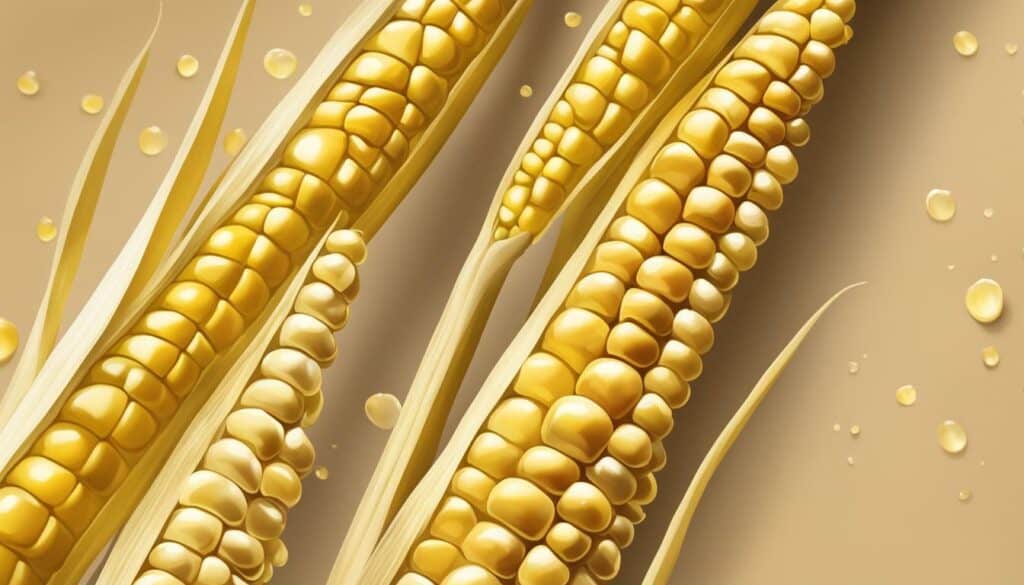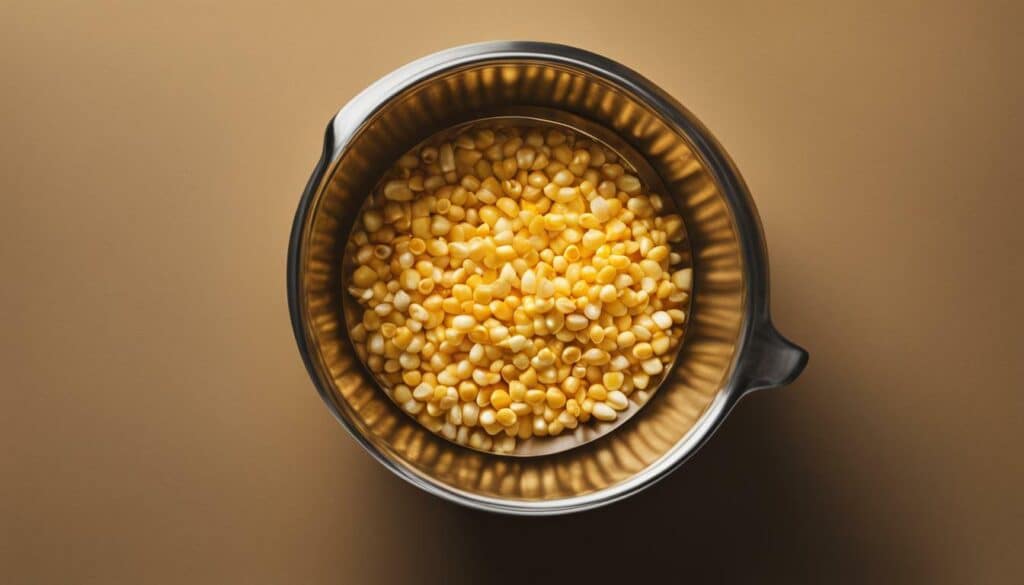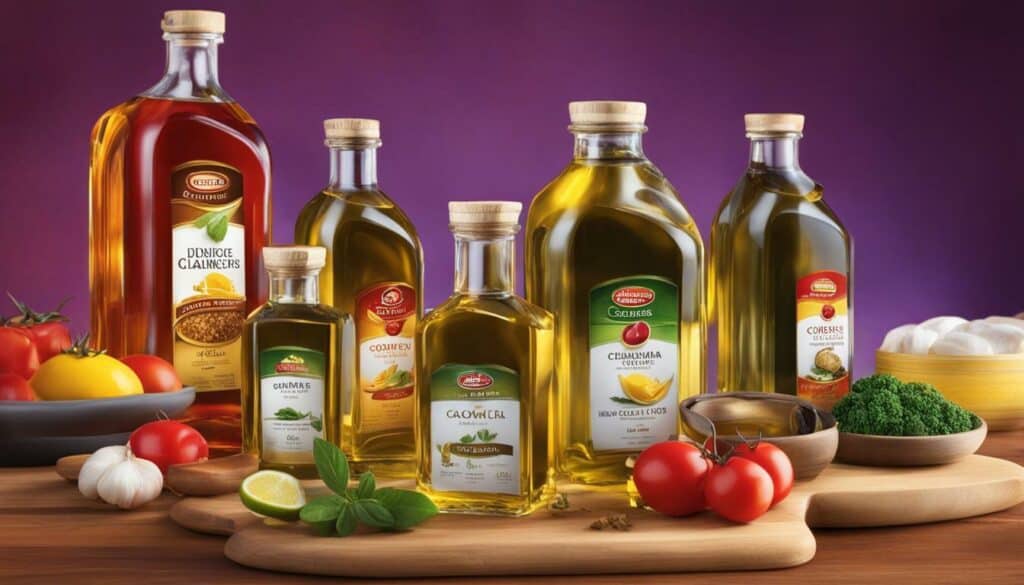Welcome to my exploration of the calories in corn oil! In this article, I will delve into the nutritional facts and health benefits of this popular cooking oil.
Key Takeaways:
- Corn oil contains 120 calories per tablespoon and is 100% fat.
- It is mostly composed of polyunsaturated omega-6 fats and contains some vitamin E.
- The refining process of corn oil involves the use of chemicals like hexane, which may have negative effects on the nervous system.
- Corn oil contains phytosterols that may have anti-tumor properties and help block the absorption of cholesterol.
- It has compounds that promote heart health, including vitamin E and linoleic acid.
Now that we have set the stage, let’s dive deeper into the world of corn oil and uncover the secrets behind its calorie content and nutritional value.
Understanding Corn Oil Nutrition Facts
Let’s start by breaking down the nutrition facts of corn oil to understand its calorie content and other key components. Corn oil is a refined vegetable oil commonly used in cooking and deep frying. It contains 120 calories per tablespoon and is 100% fat. This makes it important to consume it in moderation as part of a balanced diet.
Corn oil is mostly made up of polyunsaturated omega-6 fats, which are essential fats that the body needs but cannot produce on its own. These fats play a vital role in brain function, hormone production, and cell growth. However, it’s important to note that corn oil is high in omega-6 fats, and consuming them in excess can be harmful if not balanced with omega-3 fats.
In addition to its fat content, corn oil also contains some vitamin E, which is an antioxidant that helps protect cells from damage. Vitamin E is known for its potential benefits in supporting the immune system and promoting healthy skin. However, it’s important to keep in mind that corn oil is a highly refined product, and the refining process involves the use of chemicals like hexane, which may have negative effects on the nervous system.
Corn Oil Nutrition Facts:
| Nutrient | Amount per tablespoon |
|---|---|
| Calories | 120 |
| Total Fat | 14g |
| Saturated Fat | 2g |
| Polyunsaturated Fat | 8g |
| Monounsaturated Fat | 3g |
| Cholesterol | 0mg |
| Vitamin E | 1.9mg |
Despite these potential concerns, corn oil has its uses. It is widely available and used in various ways, including sautéing, salad dressings, and baking. One of the key advantages of corn oil is its high smoke point, making it ideal for deep frying without breaking down and producing harmful compounds.
In summary, understanding the nutrition facts of corn oil is crucial for making informed dietary choices. While it provides calories and fats, including polyunsaturated omega-6 fats, it also contains vitamin E with potential benefits. However, it’s important to be mindful of the refining process and the potential negative effects on the nervous system. Incorporating corn oil into a balanced diet can be a part of a healthy lifestyle, but moderation is key.

If you’re curious about the calorie count in corn oil, let’s take a closer look at how many calories you’ll find in a tablespoon of this versatile cooking oil. In keeping with an active lifestyle and maintaining a balanced diet, it’s essential to understand the nutritional content of the food we consume. Corn oil is a refined vegetable oil commonly used in cooking and deep frying, known for its high smoke point and mild flavor.
Per tablespoon, corn oil contains approximately 120 calories. This makes it a calorie-dense option, so it’s important to measure and use it in moderation to avoid exceeding your daily calorie intake goals. Remember, balance is key.
While corn oil primarily consists of 100% fat, it is essential to note that not all fats are created equal. Corn oil is mostly composed of polyunsaturated omega-6 fats. These essential fatty acids are required by the body for various functions but need to be balanced with omega-3 fats to maintain optimal health. Consuming too many omega-6 fats compared to omega-3 fats may have negative effects on your health. It’s important to incorporate a variety of healthy fats, such as those found in nuts, avocados, and fatty fish, to maintain a well-rounded diet.
| Nutrient | Amount per Tablespoon |
|---|---|
| Calories | 120 |
| Total Fat | 14 grams |
| Omega-6 Fats | 9.7 grams |
| Vitamin E | 4.6 mg |
While corn oil can be a beneficial addition to your culinary repertoire due to its high smoke point and versatility, it’s important to be mindful of its potential drawbacks. The refining process of corn oil involves the use of chemicals like hexane, which may have negative effects on the nervous system. Additionally, corn oil is often made from genetically modified corn and is a highly refined product, which is more likely to become oxidized and increase the risk of certain diseases.
Understanding the calorie content of corn oil empowers you to make informed decisions about your dietary choices. Remember to consume it in moderation and balance it with a variety of other healthy fats to maintain a well-rounded diet. By making conscious choices, you can enjoy the benefits of corn oil while keeping your overall health and well-being in mind.

Curious to know how corn oil measures up in terms of calorie content compared to other cooking oils? Let’s explore a comparison of common cooking oils to determine which ones are lower in calories.
When it comes to counting calories, it’s essential to choose the right cooking oil, especially if you’re watching your calorie intake. Different oils have varying calorie counts, and making informed choices can help you maintain a balanced diet without sacrificing flavor.
To give you a clear picture, here’s a comparison of the approximate calorie content per tablespoon of some commonly used cooking oils:
| Oil | Calories per tablespoon |
|---|---|
| Olive oil | 119 |
| Canola oil | 124 |
| Peanut oil | 119 |
| Sunflower oil | 120 |
| Corn oil | 120 |
As you can see, corn oil, along with olive oil, canola oil, peanut oil, and sunflower oil, contains approximately 120 calories per tablespoon. Whether you’re sautéing, deep frying, or using it in salad dressings, it’s important to be mindful of the calorie content of the cooking oil you use.

But remember, calorie count isn’t the only factor to consider when choosing a cooking oil. It’s also important to pay attention to the fat composition, vitamin content, and how the oil is processed. For those aiming for a lower-calorie option, consider exploring cooking oils labeled as “low calorie” or “light,” which often have reduced calorie content compared to their regular counterparts.
In conclusion, corn oil, like many other cooking oils, contains about 120 calories per tablespoon. While this calorie count can vary slightly depending on the brand and specific oil, it’s important to be mindful of portion sizes and choose oils that align with your dietary goals. By making informed choices about cooking oils, you can enjoy delicious meals without compromising on your health.
Exploring Corn Oil’s Health Benefits
Beyond its calorie content, corn oil offers several health benefits due to its nutritious profile. Let’s explore some of the potential advantages this cooking oil can provide.
“Corn oil contains phytosterols that may have anti-tumor properties and help block the absorption of cholesterol.”
Corn oil is rich in phytosterols, which are plant compounds that have been linked to potential anti-tumor properties. These phytosterols not only support overall health but may also help block the absorption of cholesterol, promoting heart health. By incorporating corn oil into your diet, you can harness these benefits and support your well-being.
Compounds that promote heart health
One of the standout features of corn oil is its high vitamin E content. Vitamin E is a powerful antioxidant that helps protect the body against damage from free radicals. This nutrient plays a significant role in supporting heart health by reducing oxidation and inflammation, two key factors in the development of cardiovascular diseases.
Additionally, corn oil is a good source of linoleic acid, a type of omega-6 fatty acid. Linoleic acid has been shown to have a positive impact on heart health, including lowering LDL cholesterol levels and reducing the risk of heart disease. The combination of vitamin E and linoleic acid makes corn oil a heart-healthy choice for cooking and baking.
It is important to note, however, that while corn oil can provide these health benefits, it should be consumed in moderation due to its high calorie and fat content. Balancing the consumption of corn oil with other healthy fats, such as those found in avocados or olive oil, is essential for maintaining overall well-being.
| Health Benefit | Description |
|---|---|
| Anti-Tumor Properties | Corn oil contains phytosterols that may have anti-tumor effects and help block the absorption of cholesterol. |
| Heart Health | Corn oil is rich in vitamin E and linoleic acid, which promote heart health by reducing oxidation, inflammation, and LDL cholesterol levels. |
| Nutritional Value | Corn oil provides essential nutrients, including vitamin E, omega-6 fatty acids, and phytosterols, that contribute to overall well-being. |

In conclusion, corn oil offers more than just its calorie content. With its nutritious profile and potential health benefits, it can be a valuable addition to a balanced diet. However, as with any oil, moderation is key. Incorporate corn oil mindfully, alongside other healthy fats, to reap its advantages and maintain a healthy lifestyle.
Potential Concerns about Corn Oil
While corn oil has its benefits, it’s important to be aware of potential concerns that come with consuming this highly refined cooking oil. Corn oil undergoes a refining process that involves the use of chemicals like hexane, which may have negative effects on the nervous system. These chemicals have raised concerns among health experts, particularly regarding their potential impact on nerve function.
Another concern with corn oil is its high omega-6 fat content. While omega-6 fats are essential for the body, consuming them in excess can have harmful effects. The Western diet already tends to be imbalanced in favor of omega-6 fats, and adding corn oil to the mix can further exacerbate this imbalance. It’s important to maintain a healthy ratio of omega-6 to omega-3 fats for optimal health.
In addition to the refining process and fat content, corn oil is often made from genetically modified corn. Genetically modified organisms (GMOs) have sparked debates in the food industry, and some studies have raised concerns about their long-term effects on human health. If you prefer to avoid GMOs, it may be necessary to seek out alternative cooking oils.
| Concerns with Corn Oil | Potential Risks |
|---|---|
| Refining Process | Negative effects on the nervous system due to chemicals like hexane |
| High Omega-6 Fat Content | Potential imbalance with omega-3 fats and associated health risks |
| Genetically Modified Corn | Possible long-term effects of GMO consumption |
Despite these concerns, it’s worth noting that corn oil contains phytosterols, which are plant compounds that may have anti-tumor properties and help block the absorption of cholesterol. It also contains compounds like vitamin E and linoleic acid that are beneficial for heart health. However, it’s crucial to maintain a balanced approach to consuming corn oil and consider the potential risks associated with its use.

Being informed about the potential concerns of consuming corn oil can help you make informed decisions about your dietary choices. If you have specific health conditions or concerns, it’s always best to consult with a healthcare professional or registered dietitian who can provide personalized advice based on your individual needs and circumstances.
Corn Oil and Heart Health
Corn oil contains specific compounds that can positively influence heart health. Let’s explore how these components contribute to cardiovascular well-being.
One of the key compounds found in corn oil is linoleic acid, an essential omega-6 fatty acid. Studies have shown that consuming adequate amounts of linoleic acid can help reduce the risk of heart disease. It plays a vital role in maintaining healthy cholesterol levels and promoting overall heart health.
Vitamin E is another beneficial compound present in corn oil. It acts as an antioxidant, protecting the cells in our body from damage caused by free radicals. By reducing oxidative stress, vitamin E can help lower the risk of heart disease and improve overall cardiovascular health.
Research has also suggested that corn oil’s combination of linoleic acid and vitamin E may have synergistic effects on heart health. The anti-inflammatory properties of linoleic acid, along with the antioxidant properties of vitamin E, work together to reduce inflammation and promote the health of blood vessels, supporting a healthy cardiovascular system.
| Compounds in Corn Oil | Effects on Heart Health |
|---|---|
| Linoleic Acid | Reduces risk of heart disease |
| Vitamin E | Protects against oxidative stress and lowers heart disease risk |
Corn oil’s positive impact on heart health makes it a valuable addition to a balanced diet. However, it’s important to note that moderation is key, as corn oil is high in omega-6 fats, which can be harmful if consumed in excess. Maintaining a healthy balance between omega-6 and omega-3 fats is essential for optimal heart health.
By incorporating corn oil in your cooking and ensuring a well-rounded diet, you can harness its heart-healthy benefits and support a healthier cardiovascular system.

When it comes to corn oil, it’s essential to consider the refining process and the potential effects of chemicals like hexane on the nervous system. Corn oil is a refined vegetable oil, commonly used in cooking and deep frying. It is made from corn and undergoes a refining process that involves the use of chemicals, such as hexane, to extract the oil from the corn kernels.
Refining corn oil helps remove impurities and improves its shelf life, but it can also have drawbacks. The use of chemicals like hexane during the refining process raises concerns about the potential impact on the nervous system. Hexane is a solvent that can cause neurotoxicity when exposed to high levels or over long periods.
It’s important to note that the refining process aims to remove most, if not all, of the hexane residues in the final product. However, there may still be trace amounts present, which could pose a risk to sensitive individuals or those with pre-existing neurological conditions. To minimize potential risks, it’s advisable to choose corn oil that undergoes rigorous testing and verification to ensure the removal of any harmful chemical residues.
Overall, while corn oil is a widely used cooking oil, it is important to be aware of the potential effects of the refining process and the use of chemicals like hexane. If you have concerns about the nervous system effects or are particularly sensitive to certain chemicals, it may be worth exploring alternative cooking oil options or seeking professional advice. Making informed choices about the products we consume is essential for maintaining our overall well-being.

| Oil Type | Calories per Tablespoon | Fat Composition | Smoke Point |
|---|---|---|---|
| Corn Oil | 120 | 100% fat, high in polyunsaturated omega-6 fats | 450°F (232°C) |
| Olive Oil | 119 | 100% fat, high in monounsaturated fats | 410°F (210°C) |
| Coconut Oil | 117 | 100% fat, high in saturated fats | 350°F (177°C) |
| Avocado Oil | 124 | 100% fat, high in monounsaturated fats | 520°F (271°C) |
Balancing Omega-6 Fats in Corn Oil
While corn oil contains omega-6 fats, it’s crucial to understand how these fats can be both beneficial and potentially harmful if consumed in excess. Omega-6 fats, also known as polyunsaturated fats, play a vital role in the body, including supporting brain function, regulating metabolism, and promoting cell growth. However, an imbalance between omega-6 and omega-3 fats can lead to inflammation and increase the risk of chronic diseases, such as heart disease and obesity.
It’s important to maintain a healthy balance between omega-6 and omega-3 fats in the diet. The ideal ratio of omega-6 to omega-3 fats is believed to be around 4:1 or lower. However, the typical Western diet tends to have a much higher ratio, often exceeding 20:1. This is primarily due to the widespread use of oils rich in omega-6 fats, such as corn oil, in processed foods.
To balance your intake of omega-6 fats, it’s recommended to reduce the consumption of oils high in omega-6, including corn oil, and increase the intake of foods rich in omega-3 fats, such as fatty fish (like salmon and sardines), chia seeds, and walnuts. Incorporating a variety of plant-based oils, such as olive oil and avocado oil, into your cooking routine can also help maintain a healthier omega-6 to omega-3 ratio.
| High Omega-6 Oils | Omega-6 to Omega-3 Ratio | Healthy Alternatives |
|---|---|---|
| Corn Oil | 49:1 | Olive Oil (10:1) |
| Soybean Oil | 7:1 | Canola Oil (2:1) |
| Sunflower Oil | 40:1 | Avocado Oil (15:1) |
To further enhance the nutritional value of your diet, consider consuming foods rich in omega-3 fats and other nutrients that can help counterbalance the effects of omega-6 fats. Incorporating a variety of colorful fruits and vegetables, whole grains, lean proteins, and legumes into your meals can provide a wide range of essential nutrients and promote overall health and well-being.

While corn oil can be a part of a balanced diet, it’s important to be mindful of its high omega-6 fat content. To maintain a healthy omega-6 to omega-3 ratio, it’s advisable to limit the consumption of oils high in omega-6 fats, such as corn oil, and focus on incorporating more foods rich in omega-3 fats. By striking a balance between these essential fats, you can support your overall health and reduce the risk of inflammation and chronic diseases.
Conclusion
As we conclude our exploration of the calories in corn oil, it’s important to keep in mind the nutritional facts, health benefits, and potential concerns associated with consuming this popular cooking oil.
Corn oil, a refined vegetable oil commonly used in cooking and deep frying, contains 120 calories per tablespoon and is 100% fat. It is mostly composed of polyunsaturated omega-6 fats and also contains vitamin E. With its high smoke point, corn oil is ideal for deep frying and is widely available for various culinary uses, including sautéing, salad dressings, and baking.
However, there are some potential concerns about corn oil. Its refining process involves the use of chemicals like hexane, which may have negative effects on the nervous system. Additionally, corn oil is high in omega-6 fats, which can be harmful if consumed in excess. It is often made from genetically modified corn and is a highly refined product that is more likely to become oxidized, increasing the risk of certain diseases.
On the other hand, corn oil also offers some health benefits. It contains phytosterols, which may have anti-tumor properties and help block the absorption of cholesterol. Furthermore, corn oil has compounds like vitamin E and linoleic acid that promote heart health.
When incorporating corn oil into your diet, it is important to consider these aspects and be mindful of portion sizes. As with all cooking oils, moderation is key. By understanding the nutritional facts and potential health concerns, you can make informed choices about using corn oil in your culinary endeavors.
FAQ
Q: What is corn oil?
A: Corn oil is a refined vegetable oil commonly used in cooking and deep frying.
Q: How many calories are in corn oil?
A: Corn oil contains 120 calories per tablespoon.
Q: What is the nutritional composition of corn oil?
A: Corn oil is 100% fat, mostly made up of polyunsaturated omega-6 fats. It also contains some vitamin E.
Q: Is corn oil suitable for deep frying?
A: Yes, corn oil has a high smoke point, making it ideal for deep frying.
Q: How can I use corn oil in cooking?
A: Corn oil can be used for sautéing, making salad dressings, and baking.
Q: What is the refining process of corn oil?
A: The refining process of corn oil involves the use of chemicals like hexane, which may have negative effects on the nervous system.
Q: Does corn oil have any health benefits?
A: Yes, corn oil contains phytosterols that may have anti-tumor properties and help block the absorption of cholesterol. It also has compounds that promote heart health, including vitamin E and linoleic acid.
Q: Are there any concerns associated with corn oil?
A: Corn oil is high in omega-6 fats, which can be harmful if consumed in excess. It is often made from genetically modified corn and is a highly refined product that is more likely to become oxidized, increasing the risk of certain diseases.
How Many Calories Are in Garlic Salt?
Uncovering garlic salt calorie truths can be quite revealing. As a common seasoning used in various dishes, it’s crucial to understand its nutritional profile. While the calorie content of garlic salt can vary depending on the brand and serving size, on average, one teaspoon contains around 5 calories. So, if you’re watching your calorie intake, it’s important to moderate your usage of this flavorful seasoning.





Leave a Reply